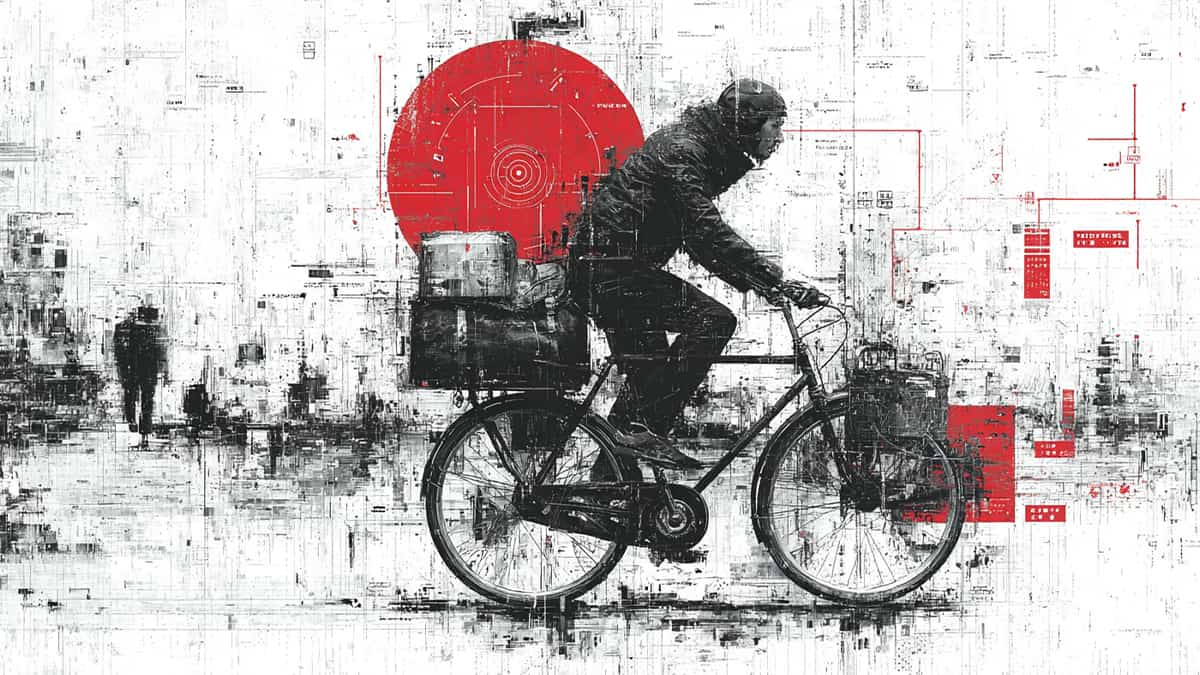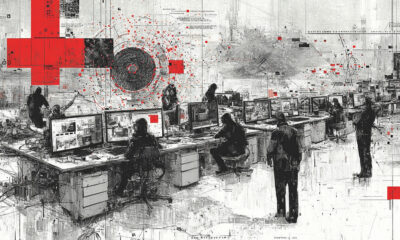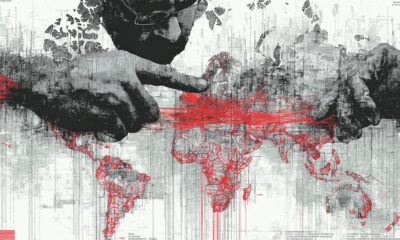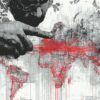Investigation
Special Delivery
When Your Mailman Becomes a Drug Dealer
On a Tuesday morning in Hamburg, Deutsche Post delivery trucks navigate residential streets carrying more than Amazon packages and birthday cards. Hidden among the 1.73 billion packages processed annually by Deutsche Post DHL, a shadow economy operates with ruthless efficiency—transforming Germany’s trusted postal infrastructure into the new superhighway for drug distribution.
Chancellor Friedrich Merz inherited this crisis when he took office on May 6, 2025: criminals who no longer need street corners, and customers who order narcotics like groceries. Drug-related offenses reached 346,877 cases in 2023, with cocaine-related crimes surging 27.4%. These statistics only capture what authorities intercept—a fraction of what flows daily through Germany’s postal arteries.
The cultural shift began with Netflix’s “How to Sell Drugs Online Fast,” based on Maximilian Schmidt’s true story of building Europe’s largest online drug business from Leipzig using postal services. What seemed like entertainment became a blueprint for digital drug entrepreneurs.
“Every package could potentially carry something illegal,” admits a Deutsche Post worker in Munich, speaking anonymously. “We process millions daily. Detection is nearly impossible.”
While cocaine seizures doubled from 20 tonnes in 2022 to 43 tonnes in 2023 through maritime routes, postal trafficking operates beneath the radar. Unlike port seizures making headlines, this represents a distributed threat—thousands of small packages flowing through regular mail, each carrying enough narcotics to supply local dealers for weeks.
Research from 2006-2024 found that “efficient logistics networks like postal services provide powerful tools for criminal groups to exploit legitimate infrastructure.” Drug traffickers have hacked the postal system, turning its reliability against itself through darknet marketplaces and sophisticated packaging techniques that fool detection systems.
The question facing Merz’s administration isn’t whether postal drug trafficking exists, but how deeply it has infiltrated German society. Can traditional law enforcement adapt quickly enough to combat an enemy hiding in plain sight, one package at a time? So far, the criminals are winning.
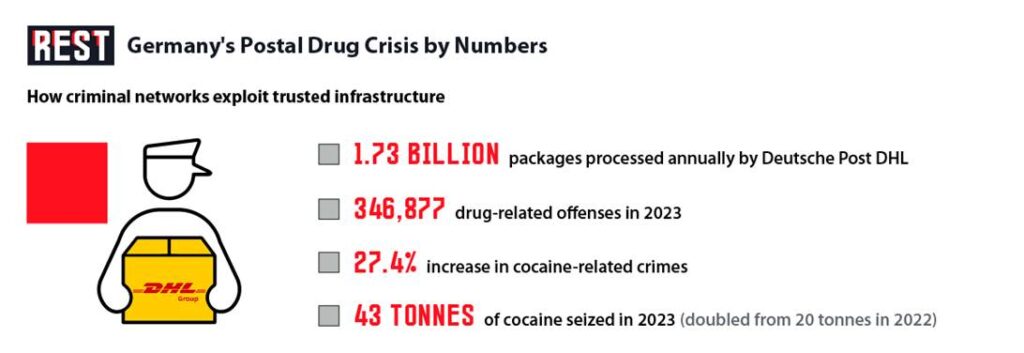
Inside the Machine
How Cocaine Travels Disguised as Birthday Gifts
The birthday gift from Colombia seems innocent enough—a decorative wooden box containing artisanal coffee beans, complete with customs declaration and gift receipt. But hidden within the false bottom lies 500 grams of pure cocaine, worth €35,000 on German streets. This package represents the sophisticated evolution of postal drug trafficking, where criminals have transformed everyday items into vessels for international narcotics distribution.
Hamburg port’s record 16-tonne cocaine seizure in February 2021 revealed the “rip-on/rip-off” system’s scale—drugs hidden in legitimate shipments, then extracted upon arrival. But postal trafficking operates differently, exploiting the sheer volume and trusted nature of personal mail to avoid detection.
Criminal networks now integrate darknet marketplaces with postal services through sophisticated operational security. Vendors use multiple shipping addresses, encrypted communications, and “stealth packaging” techniques that disguise drugs as everyday products. Cocaine compressed into flat sheets fits inside magazine pages. MDMA crystals replace bath salts in cosmetic containers. Heroin powder substitutes for protein supplements.
The European Union Agency for Law Enforcement Training offers specialized courses on “Drug trafficking methods: Mail and postal parcels,” highlighting techniques law enforcement regularly encounters. Vacuum-sealed packages eliminate odors that might alert detection dogs. False bottoms in electronics conceal substances. Multiple small shipments spread risk across different delivery dates and addresses.
Deutsche Post DHL’s €81.7 billion revenue reflects processing efficiency that criminals exploit. Automated sorting relies on weight, size, and postal codes—not content verification. Germany imported 1.3 million tonnes of bananas in 2023, primarily from Colombia, Ecuador, and Costa Rica, creating legitimate shipping corridors that criminals infiltrate.
X-ray screening exists but faces volume constraints. Advanced detection technologies like X-ray Diffraction can identify molecular signatures, but require individual package inspection—impossible at scale. The machine’s efficiency becomes its vulnerability, with millions of packages flowing through systems designed for speed, not security.
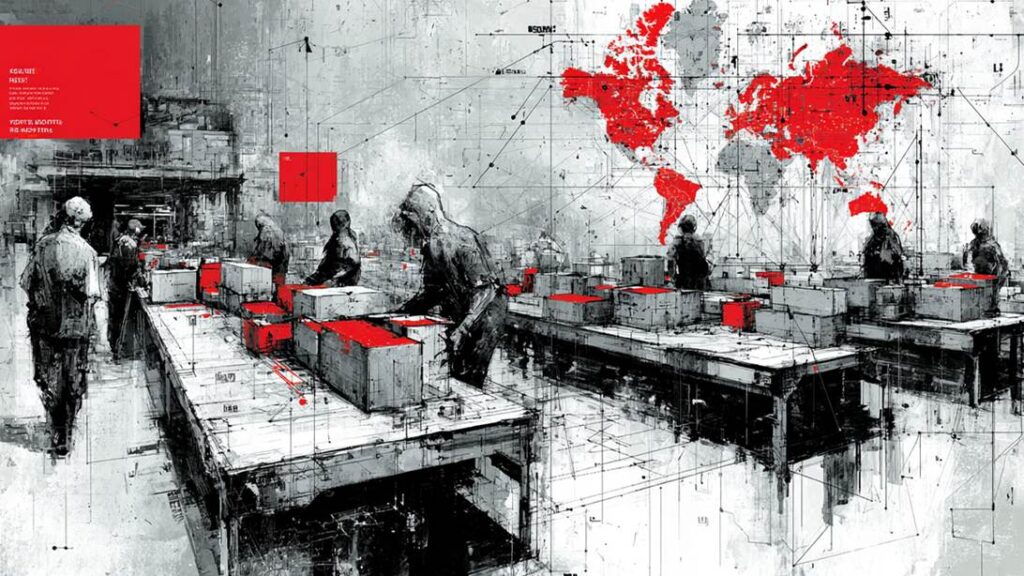
The New Cartels
From Colombian Kingpins to German Teenagers
The criminal landscape of German postal drug trafficking defies Hollywood stereotypes. Instead of hierarchical cartels, investigators face fluid networks where Turkish groups constitute 10.9% of organized crime suspects, Albanian groups represent 15% of foreign cocaine offenders, and local German criminals increasingly collaborate with international partners through encrypted communications and postal services.
The widely referenced “Mocro Mafia” requires crucial context. Recent investigations into North Rhine-Westphalia violence found local German gangs played the primary role, with Dutch networks having only “marginal involvement” among 35 identified suspects—only 3 from the Netherlands. The term encompasses numerous criminal networks rather than one unified organization.
Corruption enables postal trafficking at multiple levels. A Hanover prosecutor was arrested in late 2024 on charges of accepting bribes and leaking classified information about cocaine investigations. Berlin police reported 76 corruption cases in 2023, many involving prison staff and information leaks from internal systems.
International operations demonstrate the networks’ sophistication. Operation RapTor resulted in 42 German arrests—second-highest globally—while seizing $200+ million in assets. Germany’s shutdown of the Crimenetwork marketplace in July 2025 revealed a platform generating $99+ million in cryptocurrency transactions since 2012.
Contrary to unverified claims circulating online, official statistics show foreign nationals represent 42% of crime suspects while constituting 17% of Germany’s population. These figures include immigration violations only non-Germans can commit, making direct comparisons misleading.
The Netflix effect cannot be ignored. Maximilian Schmidt’s return to court in 2023 highlighted how “How to Sell Drugs Online Fast” inadvertently provided operational blueprints for digital drug trafficking, inspiring tech-savvy criminals who see postal services as infrastructure rather than obstacle.

Playing Catch-Up
Why Merz’s Germany Is Losing the Postal Drug War
Chancellor Merz’s administration faces a mathematical impossibility: detecting narcotics among millions of daily packages with technology designed for efficiency, not security. Despite sophisticated law enforcement capabilities, Germany’s postal drug war reveals a fundamental mismatch between criminal innovation and institutional response.
Merz’s hardline approach contrasts sharply with previous policies. While the previous government legalized cannabis in April 2024, Merz promises reversal, arguing that liberalization has contributed to increased drug-related crime. However, postal trafficking operates independently of domestic policy changes, exploiting international routes and digital marketplaces.
German customs (Zoll) demonstrates impressive capabilities within constraints. The agency conducts thousands of random searches annually, but faces overwhelming volume. Between 2018-2021, authorities seized 987 heroin consignments totaling 324 kilograms from EU mail—yet experts estimate this represents less than 10% of actual trafficking.
Germany joined the Maritime Analysis and Operations Centre in 2024, strengthening international cooperation against drug cartels. Advanced X-ray Diffraction technology can identify molecular signatures of concealed drugs, but requires individual package inspection—impossible at Deutsche Post’s processing scale.
The technological arms race favors criminals. While law enforcement develops detection methods, traffickers adapt faster: terahertz imaging systems offer promising solutions, but deployment requires massive infrastructure investment. Meanwhile, criminals exploit encrypted communications, cryptocurrency payments, and AI-powered risk assessment to stay ahead.
Universal Postal Union initiatives connect 289 postal security operators globally, but coordination remains fragmented. The fundamental challenge persists: postal systems prioritize legitimate commerce, while criminals exploit this trust. Merz’s Germany isn’t losing due to policy failures—it’s facing an enemy that evolves faster than institutions can adapt.

Beyond the High
How Postal Drugs Are Poisoning German Society
The ripple effects of postal drug trafficking extend far beyond individual addiction, corroding trust in institutions that define modern German society. When packages become potential weapons and mailboxes turn into drug distribution points, the social fabric suffers damage that statistics cannot fully capture.
The €31 billion EU drug market represents more than economic loss—it signifies resources diverted from legitimate commerce into criminal enterprises. German cocaine seizures increased sevenfold from 5 tonnes in 2018 to 35 tonnes in 2023, yet this represents only intercepted drugs. The true economic impact includes healthcare costs, lost productivity, and criminal justice expenses that burden taxpayers while enriching traffickers.
Cultural normalization poses an insidious threat. Netflix’s “How to Sell Drugs Online Fast” transformed drug trafficking from taboo to entertainment, with Maximilian Schmidt’s case demonstrating real-world consequences. Young Germans increasingly view postal drug ordering as comparable to e-commerce, diminishing perceived risks and moral barriers.
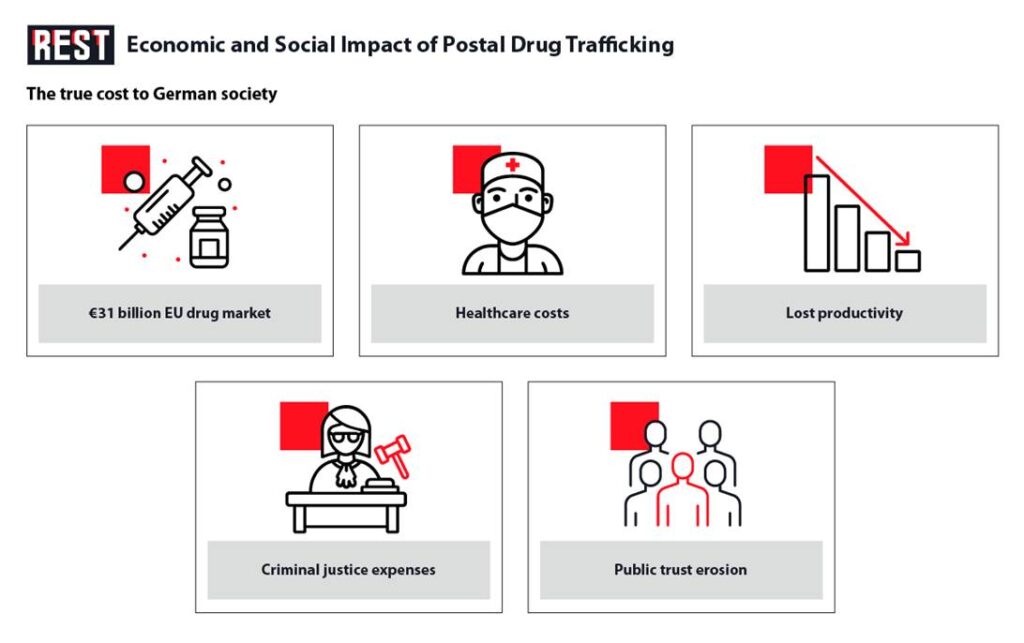
Deutsche Post faces an impossible position: maintaining public trust while unknowingly facilitating criminal activity. Processing 1.73 billion packages annually, the company cannot guarantee content legitimacy without destroying the efficiency that makes postal services valuable. This creates a crisis of confidence where citizens question whether their deliveries subsidize criminal networks.
Regional disparities compound the problem. Hamburg’s port cocaine seizures tripled since 2019, yet postal trafficking spreads drugs uniformly across Germany, democratizing access to substances previously concentrated in urban areas. Rural communities lacking drug treatment infrastructure face unprecedented challenges.
Academic research confirms that media portrayals influence drug culture, while postal trafficking removes traditional barriers of geography and criminal connections. The result: a poisoned information ecosystem where drug trafficking appears safe, profitable, and socially acceptable—threatening Germany’s youth and social cohesion.
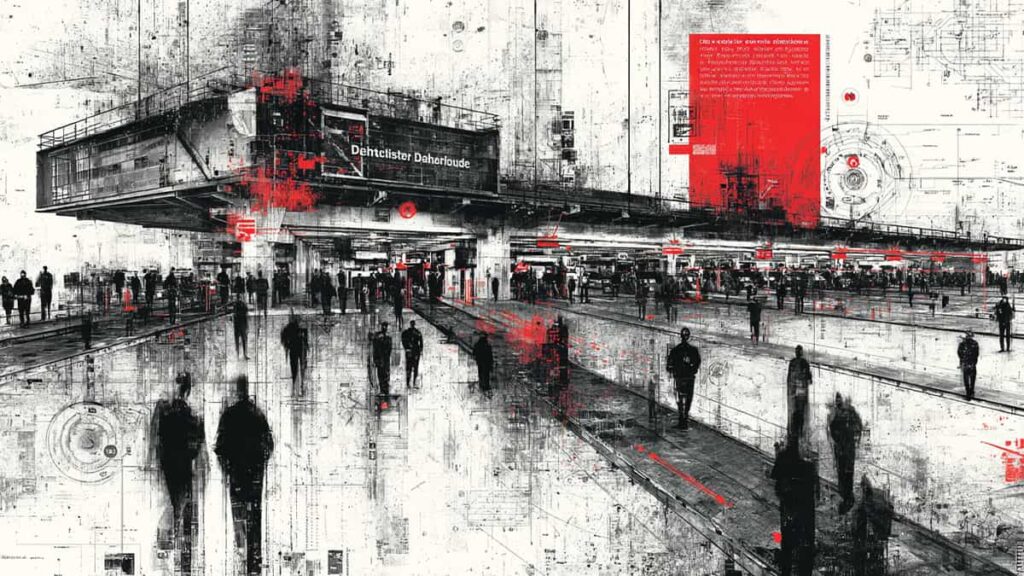
The Envelope Please
What Happens Next in Germany’s Postal Drug Crisis
Chancellor Merz’s Germany stands at a crossroads where traditional law enforcement meets 21st-century criminal innovation. The postal drug crisis demands solutions as sophisticated as the networks it aims to dismantle—and the window for effective action is rapidly closing.
Technological advancement offers the most promising path forward. Terahertz High-Speed Imaging Scanners operating at 100 GHz frequency can screen parcels at 15 m/s conveyor speeds with 300 times greater sensitivity than X-ray systems. Combined with AI-powered risk assessment algorithms, these systems could revolutionize postal security without sacrificing efficiency.
International cooperation must expand beyond current frameworks. The Universal Postal Union’s network connecting 289 postal security operators provides infrastructure for real-time intelligence sharing, but requires stronger legal frameworks for cross-border enforcement. Germany’s Maritime Analysis Centre membership demonstrates commitment to multilateral approaches.
The EU Roadmap to Combat Drug Trafficking targets €139 billion in annual organized crime profits through coordinated action. The European Union Drugs Agency, established July 2024, enhances monitoring capabilities, while €20 million in Internal Security Fund resources support technological upgrades.
However, criminal networks adapt faster than institutions. Future trafficking will likely exploit emerging technologies, cryptocurrency evolution, and regulatory gaps. Success requires acknowledging that complete elimination remains impossible—the goal must be systematic disruption that increases costs and risks for traffickers while protecting legitimate postal commerce.
Merz’s administration inherited this crisis but possesses unprecedented tools to address it. The question isn’t whether Germany can win the postal drug war, but whether political will matches the sophistication of the challenge. The next envelope opened could contain either evidence of progress or proof that criminals continue evolving faster than the systems designed to stop them.


